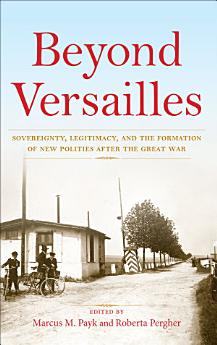Beyond Versailles: Sovereignty, Legitimacy, and the Formation of New Polities After the Great War
About this ebook
The settlement of Versailles was more than a failed peace. What was debated at the Paris Peace Conference of 1919–1920 hugely influenced how nations and empires, sovereignty, and the international order were understood after the Great War?and into the present. Beyond Versailles argues that this transformation of ideas was not the work of the treaty makers alone, but emerged in interaction with nationalist groups, anti-colonial movements, and regional elites who took up the rhetoric of Paris and made it their own. In shifting the spotlight from the palace of Versailles to the peripheries of Europe, Beyond Versailles turns to the treaties' resonance on the ground and shows why the principles of the peace settlement meant different things in different locales. It was in places a long way from Paris?in Polish borderlands and in Portuguese colonies, in contested spaces like Silesia, Teschen, and Danzig, and in states emerging from imperial collapse like Austria, Egypt, and Iran?that notions of nation and sovereignty, legitimacy, and citizenship were negotiated and contested.
"This is an excellent collected volume, well-conceived and very well written. . . . This is not at all a top-down history of the diffusion of ideas about national self-determination. Rather, it is an examination of the ways in which these ideas were taken up, re-fashioned, and reasserted at many levels to serve local and regional agendas, while at the same time influencing international debates about the meanings and possible implementations of self-determination." —Pieter M. Judson, author of The Habsburg Empire: A New History
About the author
Marcus M. Payk is Professor of Modern History at Helmut Schmidt University in Hamburg. He is author of Frieden durch Recht? Der Aufstieg des modernen Völkerrechts und der Friedensschluss nach dem Ersten Weltkrieg.
Roberta Pergher is Associate Professor of History at Indiana University Bloomington. She is author of Mussolini's Nation-Empire: Sovereignty and Settlement in Italy's Borderlands, 1922–1943.
This is an excellent collected volume, well-conceived and very well written. . . . This is not at all a top-down history of the diffusion of ideas about national self-determination. Rather, it is an examination of the ways in which these ideas were taken up, re-fashioned, and reasserted at many levels to serve local and regional agendas, while at the same time influencing international debates about the meanings and possible implementations of self-determination.
Pieter M. Judson, author of The Habsburg Empire: A New History





